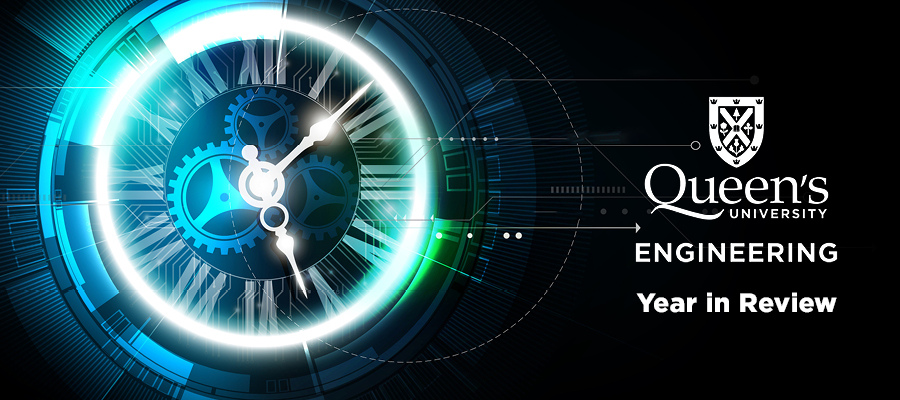
We may still be living with COVID-19, but that hasn’t stopped us from creating a bold vision this year for the future of engineering education. It’s time to take a new approach to preparing students to meet the challenges that face our world, and Queen’s is ready to lead the way. 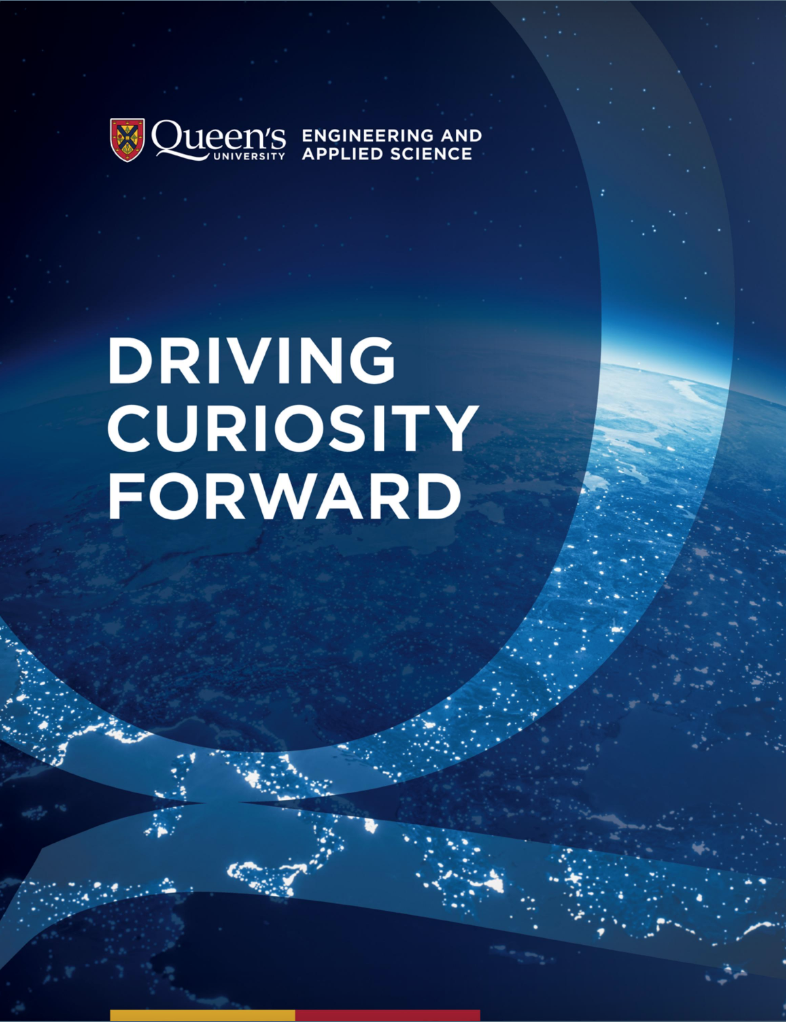
Our Strategic Plan, “Driving Curiosity Forward”, was launched in February and maps out a transformative vision for engineering education in Canada through three areas of focus: research, education and diversity. It is a renewed commitment to research growth and collaboration, an ongoing shift to challenge-based education and a focus on making Queen’s Engineering and our profession more diverse and welcoming to all.
Research: from curiosity to impact
A core component of our strategic plan is research growth and collaboration and the key to that growth is faculty renewal. We have committed to increasing the number of faculty members and graduate students. Infrastructure planning is also taking place to ensure access to core facilities and equipment.
Endowed chairs for teaching and research will support key areas of research strength directly related to the UN’s Sustainable Development goals. Mentorship activities are helping early career researchers develop their research programs. A new implementation committee, comprised of faculty, staff and students, is meeting regularly to transform research-related goals in the strategic plan into action items with measurable milestones and timelines.
The Queen’s Engineering Research Networking Day was held on October 12, 2022, to bring faculty together after the pandemic, to increase awareness about our research and to spur new research collaborations. Over 200 people attended the event, which featured 84 presentations as well as a student poster competition with 50 posters.
The annual Ingenuity Labs Robotics and AI Symposium was also held in October, with over 180 participants engaging in debates on Robotics and AI to explore recent advances and related issues around how these technologies will impact our future. A student poster competition featured 25 of our students’ work in these evolving areas.
In early June, an online Research Explorer website was launched to feature research in the Faculty of Engineering under five research themes, and to provide a searchable directory of researchers.
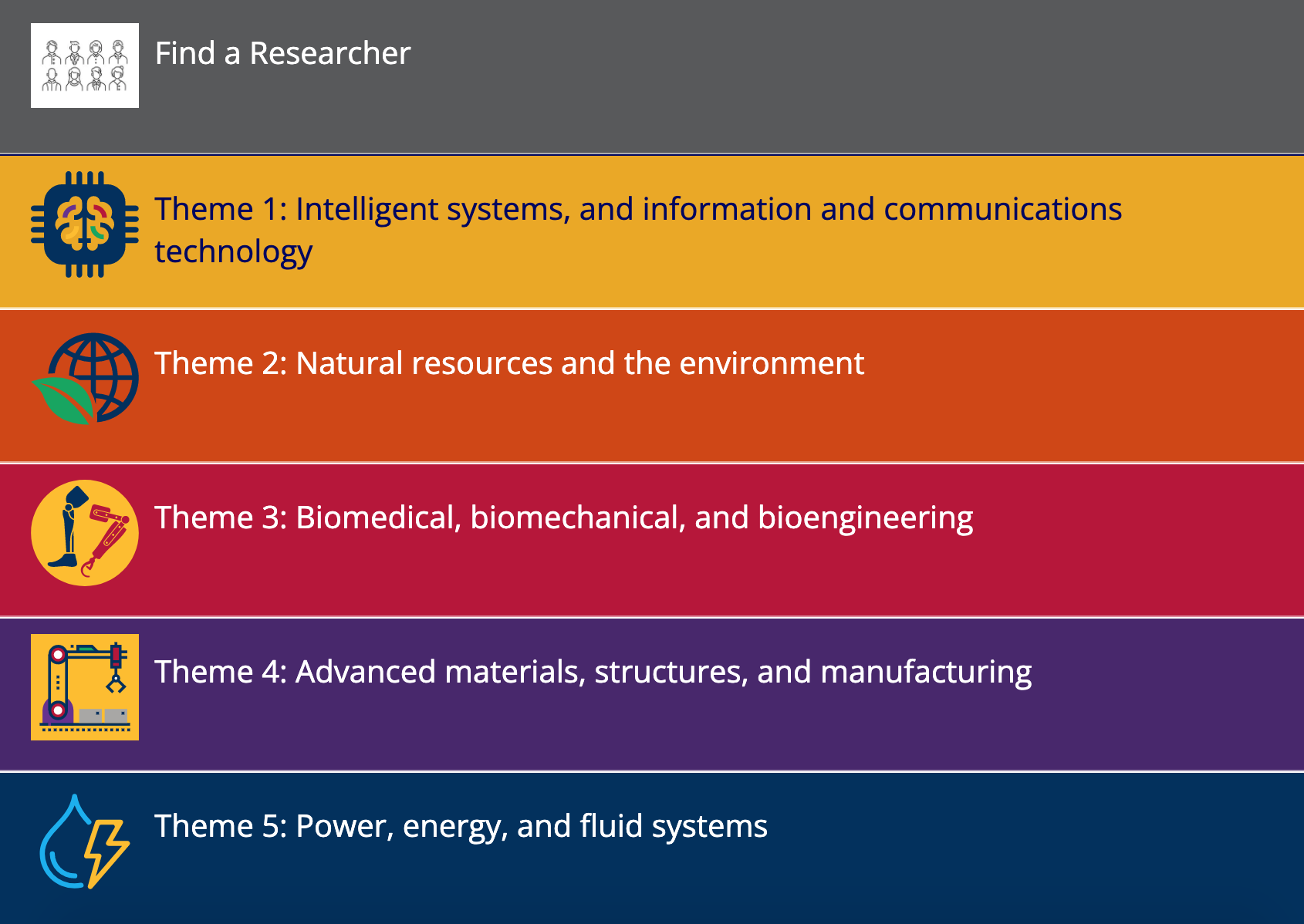
Queen’s Engineering is a key partner in the new Centre for Health Innovation, an evolution of the Human Mobility Research Centre, which was created over 40 years ago to connect experts in medicine, engineering and computer science. The Centre will now expand its focus from bone and joint disorders to address other health challenges by bringing together interdisciplinary researchers with advanced technology.
Our researchers and students are also actively involved in supporting our community. Kingston’s long-awaited Waaban Crossing opened in December, the largest infrastructure project the City has ever undertaken. During the construction phase, faculty members and students at Ingenuity Labs developed sensor technology to monitor the safety and integrity of the bridge in real time.
Innovation in education
This is the second year for our Mechatronics and Robotics Engineering program, the only one of its kind in the country. Canadian and international students continue to show great interest in this unique program, which brings together the disciplines of computer, electrical and mechanical engineering.
This fall, more than 40 Mining Engineering students participated in a full-scale virtual reality experience, exploring a custom-designed mineral processing plant, in collaboration with BBA Engineering Consultants and with financial support from the e-Campus Ontario Virtual Learning Strategy. Virtual reality experiences enhance the second and third year curriculum of our mining engineering program, giving students the opportunity to develop real-life problem-solving skills in a high-fidelity and safe environment.
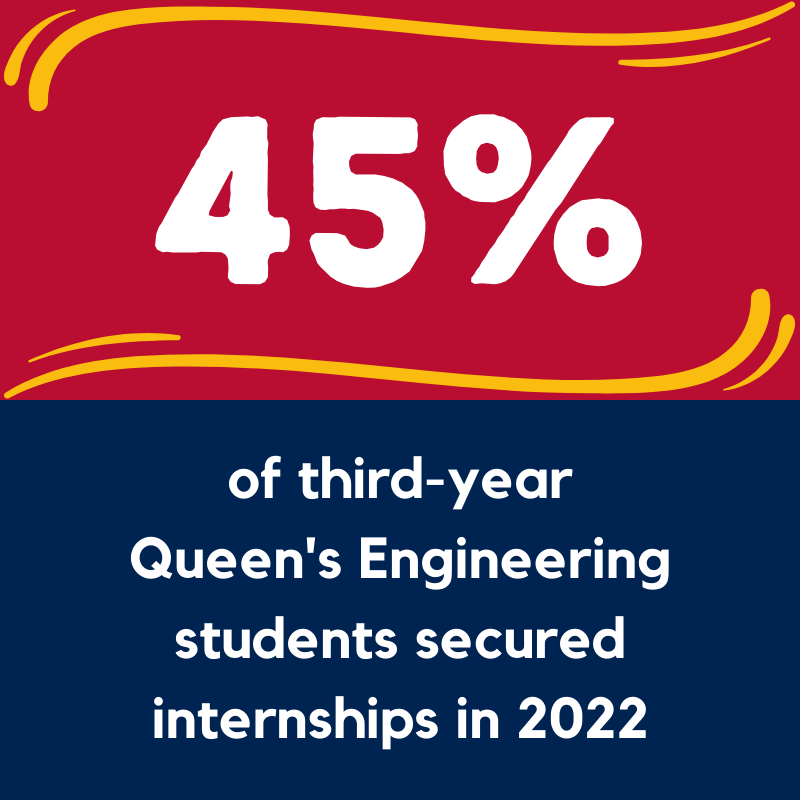 I’m excited to report that 45% of our 3rd-year class secured an internship, the biggest cohort yet. This was a real team effort thanks to the coordination and energy of the Corporate Relations Team, their partners in the departments and the Queen’s University Internship Program (QUIP), and, of course, our students.
I’m excited to report that 45% of our 3rd-year class secured an internship, the biggest cohort yet. This was a real team effort thanks to the coordination and energy of the Corporate Relations Team, their partners in the departments and the Queen’s University Internship Program (QUIP), and, of course, our students.
The Corporate Relations team doubled the number of internship opportunities available to students, thanks to our employers and alumni. Our students are making meaningful contributions in the workplace – 100% of internship employers surveyed this season said they would hire a Queen's student again.
As we enter the new year, we look forward to sustaining this demand for Queen's talent by expanding our industry partnerships, enhancing the growth of employability skills among our students and connecting them to internship and job opportunities locally and around the world.
Celebrating our alumni
Queen’s Engineering hosted three reunion weekends this fall, and one last spring, with 18 classes returning and over $2M raised through class-giving campaigns in support of student scholarships, bursaries, awards and programming.
Over 350 alumni and friends attended the Dean’s Pancake Breakfast at Homecoming, and it was my pleasure to thank them and share the impact of their volunteerism and philanthropy. During these weekends, we were also able to celebrate the establishment of a new lab in electrical engineering, which was made possible by the generosity of the class of Sc’65.
Sc’72 created a new fund to support students from systemically under-represented groups, made possible through a $1M matching challenge from Stephen Smith, BSc’72, LLD’17, the hard work and dedication of Bruce Miller and the members of the class advisory committee, and the many class members who matched Stephen’s challenge. Three of our classes (Sc’59, Sc’65 and Sc’72) were also inducted into the Millionaire’s Club, meaning their class funds now have a balance of over $1M.

The inaugural Robins Family Professorship of Engineering Chemistry, Dr. Rachel Baker, Sc’17, was appointed this year. She will provide valuable leadership to the program as it broadens its design mandate to include chemical diagnostic techniques, alternative energy systems and green chemistry applications. The Robins Family Professorship was made possible through a generous gift from alumnus Barry Robins (BSc’64), the Founder and Chair of Davos Pharma. Barry and his family joined Dr. Baker on campus to celebrate the appointment.
The Wasmund Family Memorial Scholar Awards dinner was held on November 9 at the Donald Gordon Conference Centre. This year’s event honoured benefactor Dr. Bert Wasmund (BSc '61, MSc’63, DSc’08), who sadly passed away in 2022. Award recipients, Bert’s sons, Eric (Sc’88) and Rob, faculty, and staff gathered to honour Dr. Wasmund’s memory and extraordinary contributions to Queen’s Engineering and to celebrate the many recipients of multiple Wasmund awards.
$5.1M in gifts and pledges have been received to date in 2022, and we anticipate another $1.4M before the end of the year. As well, 11 new funds have been created, which will significantly benefit our students, including student awards, bursaries and discretionary support for experiential learning opportunities such as clubs and teams.
Our alumni have also given back in many other ways, providing advice on the development of our Faculty strategic plan, peer mentoring and exchanging ideas and advice on our Queen’s Global Engineering Network platform. They are also the backbone of our successful internship program, and participate in numerous student-led activities and programming.
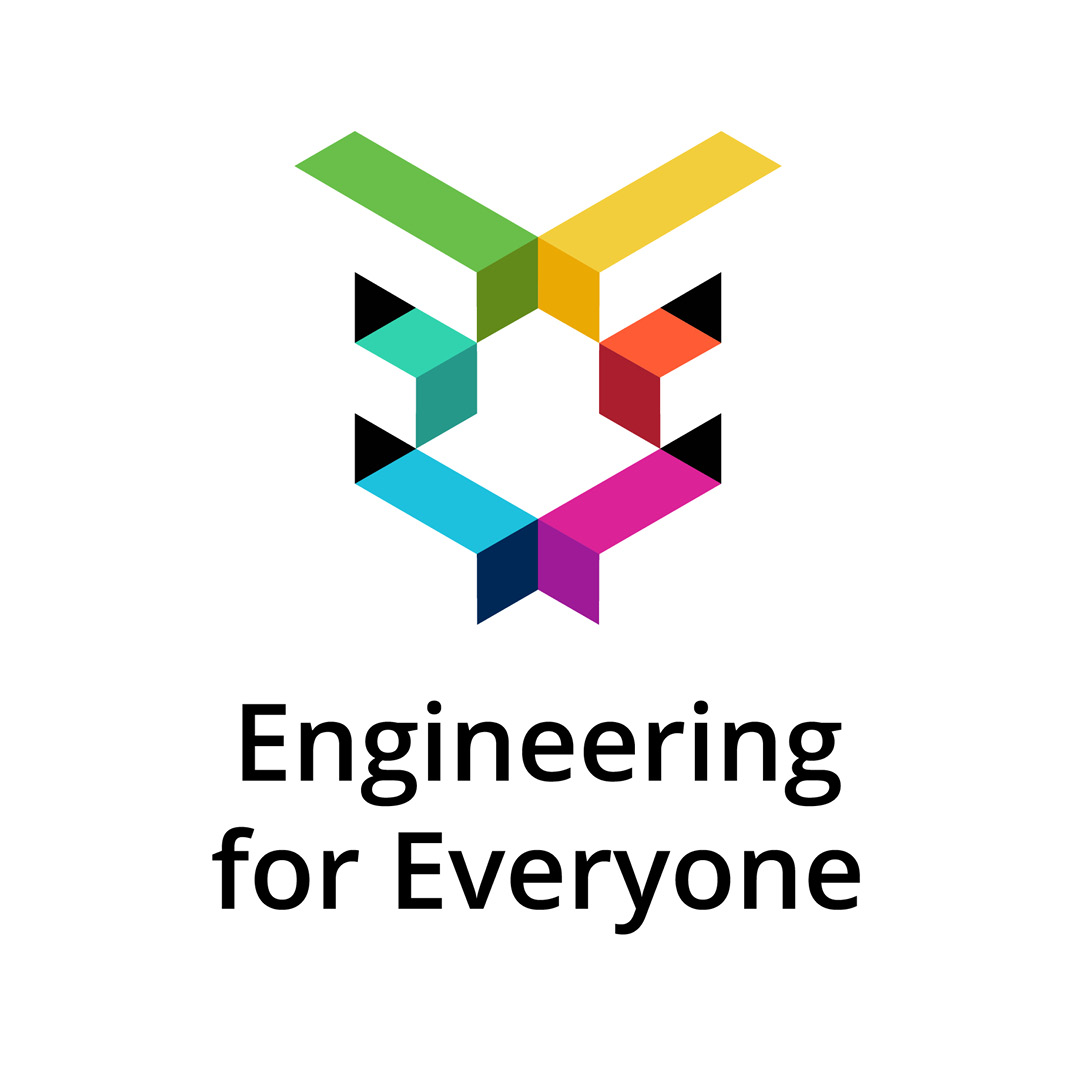 Engineering for everyone
Engineering for everyone
We need more diverse perspectives around the table if we are going to solve the world’s grand challenges. I’m proud of our commitments in many areas to provide greater opportunities for equity-seeking groups to become excited about and engaged in engineering professions, right from the early grades.
Following the appointment of the Chair for Women in Engineering in 2021, several initiatives have been developed to encourage and support women in engineering, including networking events, a grant program, and online resources for students, academic professionals and industry.
Our Connections outreach team has introduced several programs targeted to girls and women, including the free Queen’s Summer Engineering Academy for girls, and GoENG Girl events, which have attracted over 150 participants to campus.
According to Engineers Canada, only 18 per cent of working engineers licensed in Canada are women. Our numbers show our commitment to Engineers Canada’s goal of reaching 30% by 2030:
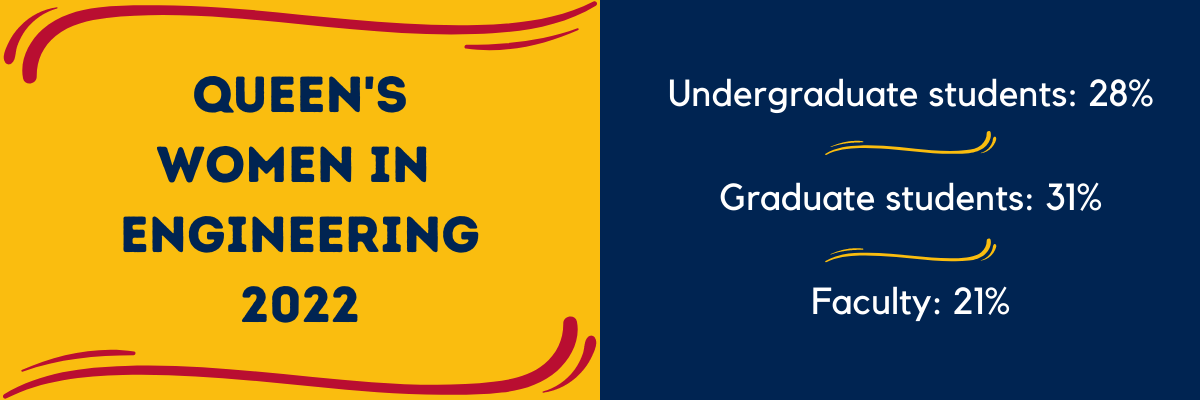
 Indigenous Futures in Engineering (InEng)
Indigenous Futures in Engineering (InEng)
2022 was the 10th anniversary of our very successful Aboriginal Access to Engineering program, which was officially re-launched this year as Indigenous Futures in Engineering (InEng).
Building on the success of InEng, its model for academic support and community-building program for Indigenous students has been expanded to the Faculties of Health Sciences and Arts & Science as STEM: Indigenous Academics. (STEM:InA).
Thanks to a generous $600,000 NSERC grant, we will be able to expand our outreach program, partnering with several First Nations communities to deliver programs within First Nations schools. Along with inspiring students to pursue STEM education, the program increases educator confidence and fluency in STEM through training, lesson modelling and course design.
IBET/ Black Youth in STEM
Since its launch last year, our Indigenous and Black Engineering and Technology (IBET) PhD Project has doubled in size from the original six university partners working together to reduce systemic barriers that exist for Indigenous and Black scholars pursing doctoral degrees. A new information hub was created this year to help students identify resources, find mentors and search for positions and internships.
Our Black Youth in STEM program continues to grow – in numbers and geographically. Our Queen’s Summer Engineering Academy saw 91 students attend the inaugural program. We’ve extended our reach to include participants across the province, with students coming from a number of regions, including Ottawa, Toronto, Brampton and St. Catherines.
Along with our specific Black Youth in STEM and Girls programs, our Connections Outreach team welcomed students back to campus this summer for the ever-popular junior and senior Queen’s Summer Engineering Academy. Programs include a range of topics, from robotics to ecosystems and biomaterials. Senior students also have the opportunity to spend a week in residence and take part in social events after classes, giving them a taste of university life.
Our Tech ‘n Tinker Trailer is also back on the road and filled with experiments to enhance the Ontario curriculum. This year, we worked with over 3,000 elementary students and nearly 900 secondary students at schools across our region.
EngWell
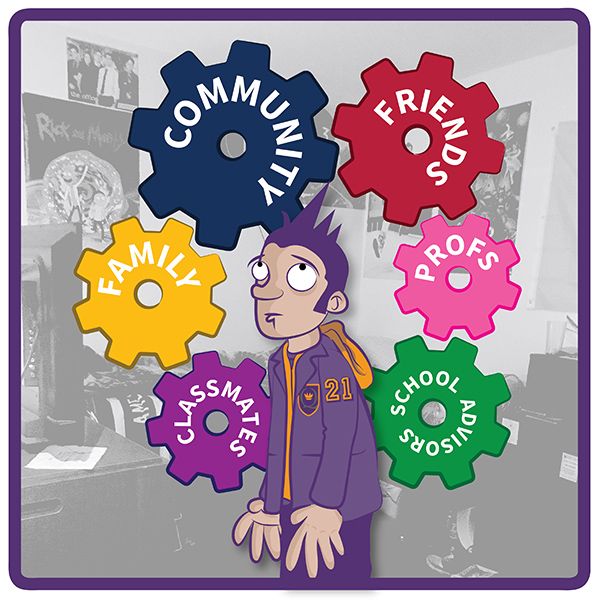 We continue to see the impact of the pandemic on our students, staff and faculty, on top of the usual stresses of university life. A two-month ‘EngWell’ campaign in March and April transformed spaces inside Beamish-Munro Hall into a unique and interactive wellness retreat, with wellness messages, fun events and pop-up stations. 64% of students said that the activities were helpful in thinking about their own health and wellness, and that it helped improve their perception of wellness as something that should be prioritized.
We continue to see the impact of the pandemic on our students, staff and faculty, on top of the usual stresses of university life. A two-month ‘EngWell’ campaign in March and April transformed spaces inside Beamish-Munro Hall into a unique and interactive wellness retreat, with wellness messages, fun events and pop-up stations. 64% of students said that the activities were helpful in thinking about their own health and wellness, and that it helped improve their perception of wellness as something that should be prioritized.
This past fall, we provided students with free access to Headspace, a mindfulness app that aims to support mental health, reduce stress and anxiety, and encourage more restful sleep. Wellness Week in November featured fun activities, therapy dogs and social opportunities to help students unwind and learn more about the resources that are available to them.
At the beginning of 2022, the Faculty implemented a Mental Health Program Lead role within Student Services, which is a new role for the Faculty and for Queen’s. The Program Lead is responsible for the planning and implementation of a wide range of programs and initiatives designed to promote mental wellness and literacy within the Engineering community. This role also acts as a key advisor to Faculty leadership members and is responsible for identifying and implementing strategic and evidence-based recommendations with the goal to eliminate mental health barriers within the Engineering community.
The Faculty further bolstered our Mental Health team within Student Services with an Engineering Embedded Counsellor and a Wellness Navigator. Although the Faculty has offered embedded counselling for a number of years, the Wellness Navigator role is also the first of its kind in the Faculty and also at Queen’s, with a primary goal to support students who may not need counselling but would benefit from a soft place to land, an assessment of their needs and then a friendly handover to the service that can help them get back on track.
I’m so proud of what’s been achieved by our students, our staff and our faculty this year. We are still challenged by the effects of the pandemic, but I’m continually amazed at how everyone has adapted and found creative ways to continue to learn, teach and grow.
I wish you all a very peaceful and joyous holiday season, and all the best for 2023!
Kevin Deluzio
Dean, Queen’s Engineering